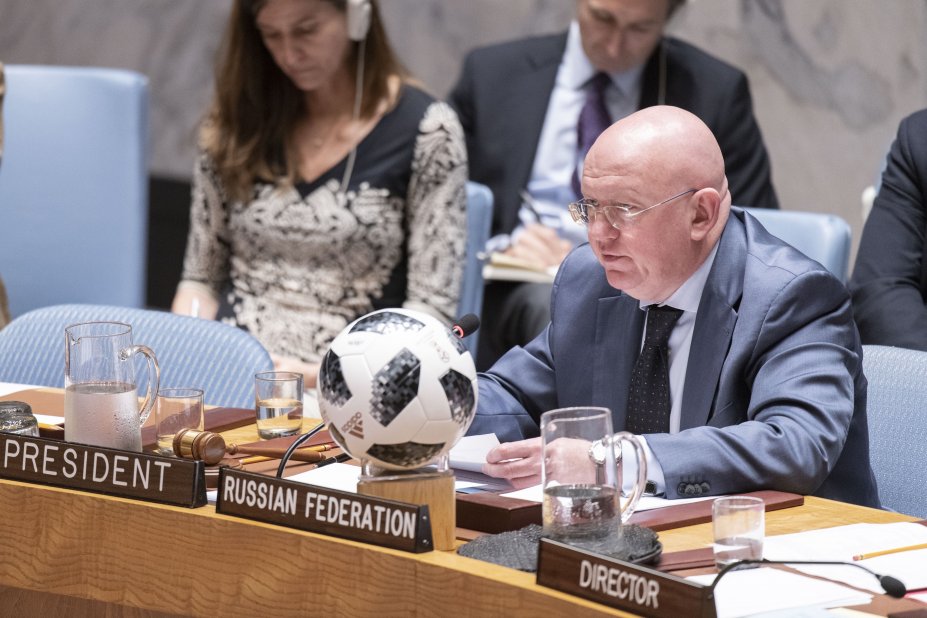Statement by Ambassador Vassily A. Nebenzia, Permanent Representative of the Russian Federation to the United Nations, at the Security Council meeting on the situation in Afghanistan
We are grateful to today’s briefers, Mr. Tadamichi Yamamoto, Special Representative of the SecretaryGeneral, Mr. Vladimir Voronkov, Under-SecretaryGeneral of the United Nations Office of CounterTerrorism and Mr. Yury Fedotov, Executive Director of the United Nations Office on Drugs and Crimes, for their thorough analysis of the current state of affairs in Afghanistan. Their assessments confirm that the main barriers to stabilizing the situation in the country are the threats represented by terrorism and drugs. The conclusion to be drawn is that our fight against them must be uncompromising, and we must do it together.
The security situation in Afghanistan continues to be the most serious cause for concern. The Taliban controls a significant part of the country’s territory. The insurgents’ latest offensive raises serious questions about their willingness to begin peace negotiations. All of this once again convinces us of the damage that is done by relying on force to resolve the problem and on attempts to marginalize some regional stakeholders and bring in others. These kinds of balancing acts worsen regional tensions and antagonize the very stakeholders who are capable of contributing to a settlement.
The Islamic State in Iraq and the Levant (ISIL) is a factor in this deteriorating situation. The group, which has as many as 10,000 fighters in its ranks, is already operating in at least nine of the 34 provinces, and increasingly often is organizing barbaric terrorist attacks with numerous terrorist casualties, including in Kabul, and continually consolidating its positions in northern Afghanistan, turning it into a springboard for further expansion into Central Asia. ISIL’s establishment of camps for training militants, including fighters from Central Asian States, is particularly worrying. We must not keep silent about these facts.
Against this backdrop, we are again hearing accusations that Russia is supporting the Taliban. That is not new. This is something we have heard about frequently in the past few years, with practically identical wording every time and zero facts to back it up. We get the distinct impression that their true goal is to divert attention from the many real mistakes that have been made in Afghanistan over the past 17 years. One of the insurgents’ sources of support is the military assistance supplied to Afghanistan by a number of our partners, which is provided without being properly accounted for and is frequently simply being stolen.
We should point out that Western military experts have mentioned this too. We have had no clear explanations of the unidentified helicopters transporting weapons and fighters for the Islamic State in Iraq and the Levant (ISIL) through Afghan airspace, which is completely controlled by our partners. The stubborn silence on this subject continues. Our demand that the situation be investigated without delay and this undisclosed practice cease still stands.
We expect a proper report, not a form letter. And in general, we need to see more determined efforts from the Afghan authorities and the foreign contingents stationed there to clear the terrorists out of northern Afghanistan.
As Mr. Fedotov rightly pointed out today, the terrorist threat is inextricably tied to the drug problem. Afghan narcotics support the terrorists financially. In 2017, the acreage in the country under drug crops increased by 63 per cent and drug production doubled. All of this intensifies the drug threat both for Afghanistan and internationally. The situation clearly demands that we ramp up our collective efforts rapidly or risk letting this get out of control for good.
We want to remind the Council that the Collective Security Treaty Organization — which has extensive experience in countering the drug threat, including through its Operation Kanal — is always ready to put its shoulder to the wheel in this area. At the same time, we believe that the Afghans themselves must play the decisive role. After all, it is the country’s people who end up being the main victims of illegal business.
We welcome President Ghani’s statement on the announcement and subsequent extension of the temporary ceasefire. It is important that these measures not be expanded to the international terrorist groups operating in Afghanistan, especially ISIL. We hope that the peace initiatives will give impetus to ending the fratricidal war in Afghanistan and to launching a peaceful dialogue and a process of national reconciliation. We strongly urge the Taliban to respond in kind. We support the existing formats for national reconciliation in Afghanistan.
However, we believe firmly that the principle of honest and equitable partnership, taking the interests of all the regional stakeholders into account, that forms the basis of the Moscow format and mechanism of the revived Shanghai Cooperation Organization-Afghanistan Contact Group, is ideally suited to the task of launching the negotiation process. In that context, we note the Contact Group’s successful holding on 28 May in Beijing of its second meeting, in which the participants unanimously affirmed their readiness to promote interaction within its framework based on the protocol defining the priority tasks and modalities for the mechanism’s work. Parliamentary elections, followed by a presidential election, are approaching in Afghanistan.
We support holding them on schedule and take note of the authorities’ statement regarding the successful completion of the voter registration procedure. In the circumstances, it is more important than ever to keep to a balanced internal political policy. We cannot allow Afghan society to become ethnically polarized or permit any infringements on the rights of minorities. The elections should be inclusive and a powerful force for consolidation, bringing Afghanistan one step closer to attaining full political and economic independence and returning it to the path of sustainable development.
It is obvious to us that ensuring broad regional and international cooperation will help to achieve that goal. Russia is ready for constructive work.
